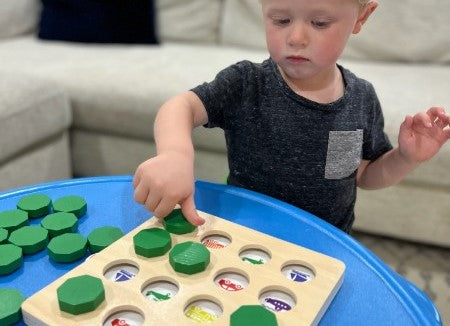When it comes to choosing toys for children, the array of options can be overwhelming for parents and guardians alike. The debate often arises between conventional retail toys and Montessori toys, a choice that could significantly affect a child's developmental journey. Understanding the core differences between these two categories is crucial to making an informed decision.
Understanding Regular Toys
Design and Purpose
Regular toys are primarily designed to entertain. They come in a variety of forms, from action figures and dolls to electronic gadgets and elaborate playsets. The vibrant colors, flashing lights, and catchy tunes are all designed to capture a child's attention, albeit often temporarily.
Material and Durability
Most regular toys are made from plastic, which can be less durable and harder to recycle. The primary focus often leans towards making the toy visually appealing rather than sustainable or long-lasting. However, some brands incorporate higher-quality materials to balance cost and durability.
Educational Value
While many regular toys claim educational value, their benefits can be superficial. For example, an alphabet puzzle might teach letter recognition, but it might not engage a child in meaningful learning if it's noisy and crowded with extra features.
Gaining Insight into Montessori Toys
Philosophy and Origins
Montessori toys are based on the educational philosophy developed by Dr. Maria Montessori in the early 20th century. This approach emphasizes hands-on, self-paced, and collaborative learning. The aim is to foster an environment where children can develop their cognitive and motor skills while cultivating a love for learning.
Design and Functionality
Montessori toys are intentionally designed to be simple but purposeful. Their minimalist aesthetic - often featuring natural wood and neutral colors - serves to focus a child's attention on the activity itself. These toys encourage problem-solving, fine motor skills, and creative thinking, all while promoting independence and responsibility.
Material and Longevity
Montessori toys are built to last from high-quality, natural materials like wood, cotton, and metal. They are durable, sustainable, and often handcrafted, which means they not only last longer but also have a lesser environmental impact.
Educational Value
The educational value of Montessori toys is profound. Each toy is specifically designed to target key developmental milestones and skills. For example:
- Stacking and Sorting Toys: Enhance fine motor skills and hand-eye coordination.
- Puzzle Toys: Develop logical thinking and problem-solving abilities.
- Practical Life Toys: Foster daily life skills like tying shoes or pouring liquids.
Key Differences Between Regular and Montessori Toys
Purpose and Intent
Regular toys are often designed for instant gratification and temporary entertainment, equipped with audio-visual stimulants that may overwhelm rather than engage a child. Montessori toys, on the other hand, are created to develop specific skills and foster a deeper understanding of the world.
Quality Over Quantity
In the realm of regular toys, the adage "more is better" often applies, emphasizing piles of toys that might lose appeal quickly. Montessori toys follow the "less is more" principle, focusing on fewer, high-quality items that provide deeper and more meaningful engagement.
Active Learning vs. Passive Entertainment
Regular toys often result in passive entertainment, captivating children with their flashing lights and catchy sounds but requiring little in the way of active participation. Montessori toys emphasize active learning, encouraging children to explore, experiment, and understand the underlying concepts at their own pace.
Durability and Environmental Impact
The plastic-centric manufacturing of regular toys can mean a quicker breakdown and a greater environmental footprint. Montessori toys' use of durable, natural materials not only makes them more environmentally friendly but also ensures they withstand the test of time, often being passed down through generations.
Encouragement of Autonomy
Regular toys, especially electronic ones, often set limitations, guiding the play through pre-programmed actions that can stifle creativity. Montessori toys promote autonomy, allowing children to explore multiple outcomes and solutions freely, thus boosting their confidence and independence.
Practical Tips for Choosing Montessori Toys
Observe Your Child's Interests
Montessori education emphasizes following the child. Pay close attention to what your child naturally gravitates towards, and choose toys that align with those interests.
Choose Open-Ended Toys
Opt for toys that can be used in multiple ways and grow with your child's skills. Examples include building blocks, which can be used to create a variety of structures, and puzzles with different levels of complexity.
Prioritize Sensory Engagement
Children learn best when their senses are engaged. Look for toys that involve different textures, weights, and sounds, such as fabric swatches of various materials or sound-making toys like wooden musical instruments.
Look for Real-Life Tools
Montessori emphasizes practical life skills. Toys that mimic real-life activities, such as child-sized kitchen sets or gardening tools, can be both educational and enjoyable for your child.
Why Choosing Montessori Toys Matter
Opting for Montessori toys can have long-lasting positive effects on your child's development. These toys:
- Encourage self-directed learning
- Enhance concentration and focus
- Build problem-solving skills
- Improve fine motor skills
- Promote creativity and imagination
In essence, Montessori toys bring quality and intention into play, making each moment an opportunity for meaningful learning and growth.
Understanding the fundamental differences between regular and Montessori toys can guide parents in making beneficial choices for their children's development. Montessori toys stand out for their purposeful design, durability, and the high-quality educational experiences they provide. They emphasize less on instant gratification and more on fostering a child's holistic growth.
Discover the Difference with Discovery Toys
Make the switch to quality educational toys with Discovery Toys. With decades of expertise, Discovery Toys offers a carefully curated selection of Montessori-inspired toys for every stage of childhood, from newborns to school-aged children. Discover the joy of meaningful play and empower your child's development today. Explore our toys and invest in a brighter future for your child.
